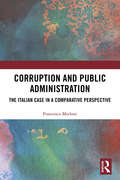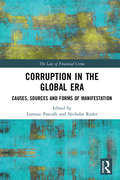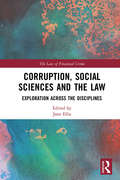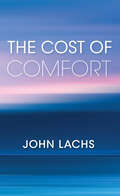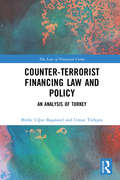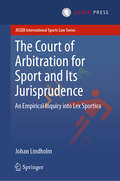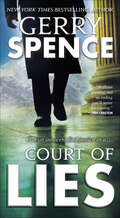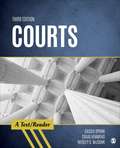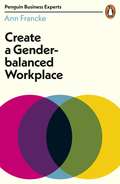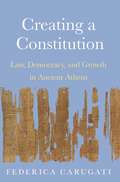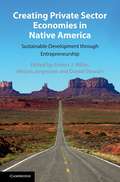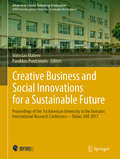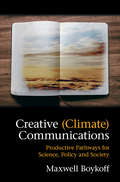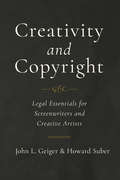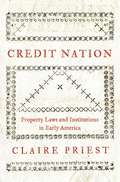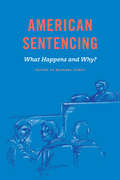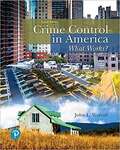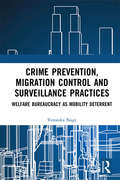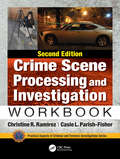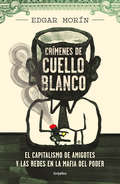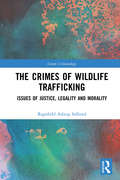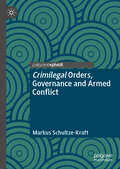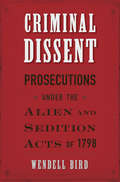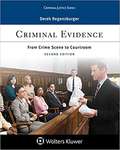- Table View
- List View
Corruption and Public Administration: The Italian Case in a Comparative Perspective
by Francesco MerloniCorruption and Public Administration looks at public sector organizations and what they have achieved since signing the UN Convention Against Corruption (UNCAC) Agreement in Merida in 2004. It examines how the signee countries engaged in the set-up of institutions to contain corruption in public administration, and how these governments and institutions have progressed. The book compares several developed countries, and undertakes an especially detailed examination of Italy. It highlights strengths and weaknesses, and proposes organizational means of addressing the issues, which include diversity in organizational structures and systems, and a focus on prevention rather than repression. The book shines a light on anti-corruption practices and aims to foster open discussion about this pressing topical issue among peers in all relevant fields of the social sciences.
Corruption in the Global Era: Causes, Sources and Forms of Manifestation (The Law of Financial Crime)
by Lorenzo Pasculli Nicholas RyderCorruption is a globalising phenomenon. Not only is it rapidly expanding globally but, more significantly, its causes, its means and forms of perpetration and its effects are more and more rooted in the many developments of globalisation. The Panama Papers, the FIFA scandals and the Petrobras case in Brazil are just a few examples of the rapid and alarming globalisation of corrupt practices in recent years. The lack of empirical evidence on corrupt schemes and a still imperfect dialogue between different disciplinary areas and between academic and practitioners hinder our knowledge of corruption as a global phenomenon and slow down the adoption of appropriate policy responses. Corruption in the Global Era seeks to establish an interdisciplinary dialogue between theory and practice and between different disciplines and to provide a better understanding of the multifaceted aspects of corruption as a global phenomenon. This book gathers top experts across various fields of both the academic and the professional world – including criminology, economics, finance, journalism, law, legal ethics and philosophy of law – to analyze the causes and the forms of manifestation of corruption in the global context and in various sectors (sports, health care, finance, the press etc.) from the most disparate perspectives. The theoretical frameworks elaborated by academics are here complemented by precious insider accounts on corruption in different areas, such as banking and finance and the press. The expanding links between corrupt practices and other global crimes, such as money laundering, fraud and human trafficking, are also explored. This book is an important resource to researchers, academics and students in the fields of law, criminology, sociology, economics and ethics, as well as professionals, particularly solicitors, barristers, businessmen and public servants.
Corruption, Social Sciences and the Law: Exploration across the disciplines (The Law of Financial Crime)
by Jane EllisThe problem of corruption, however described, dates back thousands of years. Professionals working in areas such as development studies, economics and political studies, were the first to most actively analyse and publish on the topic of corruption and its negative impacts on economies, societies and politics. There was, at that time, minimal literature available on corruption and the law. The literature and discussion on bribery and corruption, as well as on the negative impact of each and what is required to address them, particularly in the legal context, are now considerable. Corruption and anti-corruption are multifaceted and multi-disciplinary. The focus now on the law and compliance, and perhaps commercial incentives, is relatively easy. However, corruption, anti-corruption and the motivations for them are complex. If we continue to discuss, debate, engage, address corruption and anti-corruption in our own disciplinary silos, we are unlikely to significantly progress the fight against corruption. What do terms such as 'culture of integrity', 'demand accountability', ‘transparency and accountability’ and ‘ethical corporate culture’ dominating the anti-corruption discourse mean, if anything, in other disciplines? If they are meaningless, what approach would practitioners in those other disciplines suggest be adopted to address corruption. What has their experience been in the field? How can the work of each discipline contribute to the work of whole and, as such, improve our work in and understanding of anti-corruption? This book seeks to answer these questions and to understand the phenomenon more comprehensively. It will be of value to researchers, academics, lawyers, legislators and students in the fields of law, anthropology, sociology, international affairs, and business.
The Cost of Comfort (American Philosophy)
by John LachsWhy do we feel empty when our lives seem so full? A philosopher&’s &“clear, engaging reflection&” on the psychic risks of today&’s world (John T. Lysaker, author of After Emerson). While comfort has not always reached everyone evenly, most of us who live in the United States today reap the benefits of modern life. We live longer, we eat better food, we have access to good medical care, and we can stay in touch with loved ones who are far away. Yet, as philosopher John Lachs observes, these comfortable lives come at a cost: our increasing unhappiness. Irresponsible behavior, including by those in positions of power in governments and corporations, only increases and multiplies feelings of bitterness and disaffection. In this book, Lachs argues that this dizzyingly complex world often inspires isolation, and that deeper engagement with it is required in order to dispel our growing psychic distance. Lachs advocates for mediation and champions education, advertising, openness, and transparency to help individuals understand the roles they play in society and to nullify claims to blamelessness. Lachs suggests new rules for responsibility and argues that examining and understanding the consequences of one&’s actions is imperative to overcoming the ills and problems of the modern world—and to find the fulfillment we seek. &“A very clear, engaging reflection on a genuine contemporary issue: deep feelings of disengagement and bewilderment about how to live responsibly in an almost overwhelmingly complex world.&” —John T. Lysaker, author of After Emerson
Counter-Terrorist Financing Law and Policy: An analysis of Turkey (The Law of Financial Crime)
by Burke Uğur Başaranel Umut TürkşenSince the 9/11 attacks the world has witnessed the creation of both domestic and international legal instruments designed to disrupt and interdict the financial activities of terrorists. This book analyses the counter-terrorist financing law (CTF), policy and practice at the national level, focusing on Turkey. The work examines the limits and capabilities of CTF efforts on terrorism threats and determines the effectiveness of CTF efforts in Turkey, a country which has a pivotal role in terms of countering terrorism regionally and internationally. <P><P>The Turkish case-study is supported by an empirical study involving 37 semi-structured interviews with CTF practitioners and law enforcement experts with different affiliations and backgrounds. The findings illustrate that Turkey’s CTF system has not obtained an adequate level of effectiveness as a result of lack of proper implementation of its policy in the bureaucratic, legal and operational spheres. It is evident that the administrative and legal systems in Turkey are established according to the ‘one-size-fits-all’ international CTF standards and thus are compliant with the international CTF benchmarks, yet the interviews reveal significant challenges at the implementation level including lack of training and financial security, heavy handed bureaucracy, inadequate coordination and communication between international and national levels. <P><P>The book will be an invaluable resource for academics, students and policy-makers working in the areas of financial crime and terrorism.
The Court of Arbitration for Sport and Its Jurisprudence: An Empirical Inquiry into Lex Sportiva (ASSER International Sports Law Series)
by Johan LindholmThis book takes a close look at the Court of Arbitration for Sport (CAS), challenging existing claims and answering previously unanswered questions, by considering all of its publicly available decisions, both in its entirety as a body of jurisprudence and on a case-by-case level.It also investigates the actors involved in adjudication before the CAS, both the parties that bring disputes before the CAS and the arbitrators that resolve them, and in so doing establish precedents that govern sports generally.While the book relies upon and includes more traditional legal theory and analysis, it combines this with an empirical analysis of a large portion of the CAS's decisions. Hereby it relies upon and relates to the theory of the development of a transnational legal order in sports, the lex sportiva.The publication is targeted at and will benefit those professionally working in or interested in the fields of sports law, arbitration law, transnational law, or empirical legal studies.Johan Lindholm is a Professor of Law at Umeå University in Sweden.
Court of Lies: A Novel
by Gerry SpenceFrom Gerry Spence, one of America’s greatest trial attorneys and the New York Times bestselling author of How to Argue and Win Every Time, comes an explosive courtroom thriller of murder, passion, and the twists and treachery of law and justice. Lillian Adams is going on trial for the murder of her wealthy husband before Judge John Murray, to whom she has been like a daughter since childhood. Despite this long, shared history, both the prosecutor and defense attorney agree that Murray should sit on the case, and Murray himself knows he must. For he believes that if he steps down and another judge is appointed, there will be little hope for Lillian. The prosecutor is a sadistic psychopath who will pervert the law to convict Lillian and do everything in his power to hurt Judge Murray. And Murray must save Lillian.Gerry Spence takes readers through shocking twists and suspenseful courtroom scenes that only the great maestro of the courtroom himself could create. Court of Lies goes beyond being a great legal thriller. It questions the very basis of our legal system and its ability to discover the truth and deliver justice.At the Publisher's request, this title is being sold without Digital Rights Management Software (DRM) applied.
Courts: A Text Reader (Sage Text/Reader Series in Criminology and Criminal Justice)
by Cassia Spohn Craig T. Hemmens Wesley S. McCannThis book provides more in the way of text and pedagogy and uses recent research-based articles to help students understand courts. This book is unique in that it is a hybrid text/ reader offering the best of both worlds. It includes a collection of articles on courts that have previously appeared in a number of leading criminal justice/criminology journals along with original textual material that explains and synthesizes the readings. Some of the best recent research are selected and assembled in this text/reader for an undergraduate or graduate courts class.
Create a Gender-Balanced Workplace (Penguin Business Experts Series)
by Ann FranckeEquality at work expert Ann Francke reveals how to understand and tackle the damaging consequences of gender imbalance in the workplaceGender balance is first and foremost a business issue. McKinsey estimates we could add 28 trillion to global GDP if we achieved gender equality everywhere - that is more than the GDPs of the US and China combined. But it's so much more than that. Gender balance is one of the best levers we can pull to build better managers and leaders at every level, improve team performance and create better cultures where everyone can thrive.In the Penguin Experts: Create a Gender-Balanced Workplace, Ann Francke, the CEO of the Chartered Management Institute (CMI), introduces her solution to combating the problems at the heart of the continued imbalance and offers clear, actionable strategies for making a positive change in your organisation.
Creating a Constitution: Law, Democracy, and Growth in Ancient Athens
by Federica CarugatiA comprehensive account of how the Athenian constitution was created—with lessons for contemporary constitution-buildingWe live in an era of constitution-making. More than half of the world's constitutions have been drafted in the past half-century. Yet, one question still eludes theorists and practitioners alike: how do stable, growth-enhancing constitutional structures emerge and endure? In Creating a Constitution, Federica Carugati argues that ancient Athens offers a unique laboratory for exploring this question. Because the city-state was reasonably well-documented, smaller than most modern nations, and simpler in its institutional makeup, the case of Athens reveals key factors of successful constitution-making that are hard to flesh out in more complex settings.Carugati demonstrates that the institutional changes Athens undertook in the late fifth century BCE, after a period of war and internal strife, amounted to a de facto constitution. The constitution restored stability and allowed the democracy to flourish anew. The analysis of Athens's case reveals the importance of three factors for creating a successful constitution: first, a consensus on a set of shared values capable of commanding long-term support; second, a self-enforcing institutional structure that reflects those values; and, third, regulatory mechanisms for policymaking that enable tradeoffs of inclusion to foster growth without jeopardizing stability.Uniquely combining institutional analysis, political economy, and history, Creating a Constitution is a compelling account of how political and economic goals that we normally associate with Western developed countries were once achieved through different institutional arrangements.
Creating Private Sector Economies in Native America: Sustainable Development through Entrepreneurship
by Robert J. Miller Miriam Jorgensen Daniel StewartNative nation economies have long been dominated by public sector activities - government programs and services and tribal government-owned businesses - which do not generate the same long-term benefits for local communities that the private sector does. In this work, editors Robert Miller, Miriam Jorgensen, Daniel Stewart, and a roster of expert authors address the underdevelopment of the private sector on American Indian reservations, with the goal of sustaining and growing Native nation communities, so that Indian Country can thrive on its own terms. Chapter authors provide the language and arguments to make the case to tribal politicians, Native communities, and allies about the importance of private sector development and entrepreneurship in Indigenous economies. This book identifies and addresses key barriers to expanding the sector, provides policy guidance, and describes several successful business models - thus offering students, practitioners, and policymakers the information they need to make change.
Creative Business and Social Innovations for a Sustainable Future: Proceedings Of The 1st Aue International Research Conference - Dubai, Uae 2017 (Advances in Science, Technology & Innovation)
by Miroslav Mateev Panikkos PoutziourisThe book presents high-quality research papers presented at the 1st AUE International research conference, AUEIRC 2017, organized by the American University in the Emirates, Dubai, held on November 15th-16th, 2017. The book is broadly divided into three sections: Creative Business and Social Innovation, Creative Industries and Social Innovation, Education and Social Innovation. The areas covered under these sections are credit risk assessment and vector machine-based data analytics, entry mode choice for MNE, risk exposure, liquidity and bank performance, modern and traditional asset allocation models, bitcoin price volatility estimation models, digital currencies, cooperative classification system for credit scoring, trade-off between FDI, GDP and unemployment, sustainable management in the development of SMEs, smart art for smart cities, smart city services and quality of life, effective drivers of organizational agility, enterprise product management, DEA modeling with fuzzy uncertainty, optimization model for stochastic cooperative games, social media advertisement and marketing, social identification, brand image and customer satisfaction, social media and disaster management, corporate e-learning system, learning analytics, socially innovating international education, integration of applied linguistics and business communication in education, cognitive skills in multimedia, creative pedagogies in fashion design education, on-line summative assessment and academic performance, cloud concept and multimedia-based learning in higher education, hybrid alliances and security risks, industry and corporate security significance, legal regulation and governance. The papers in this book present high-quality original research work, findings and practical development experiences, and solutions for a sustainable future.
Creative (Climate) Communications: Productive Pathways for Science, Policy and Society
by Maxwell BoykoffConversations about climate change at the science-policy interface and in our lives have been stuck for some time. This handbook integrates lessons from the social sciences and humanities to more effectively make connections through issues, people, and things that everyday citizens care about. Readers will come away with an enhanced understanding that there is no 'silver bullet' to communications about climate change; instead, a 'silver buckshot' approach is needed, where strategies effectively reach different audiences in different contexts. This tactic can then significantly improve efforts that seek meaningful, substantive, and sustained responses to contemporary climate challenges. It can also help to effectively recapture a common or middle ground on climate change in the public arena. Readers will come away with ideas on how to harness creativity to better understand what kinds of communications work where, when, why, and under what conditions in the twenty-first century.
Creativity and Copyright: Legal Essentials for Screenwriters and Creative Artists
by John L. Geiger Howard SuberInspired by Strunk & White's The Elements of Style, this elegant, short reference is the perfect guide for screenwriters and creative artists looking to succeed as industry professionals. Readers will quickly understand the laws that govern creativity, idea-making, and selling, and learn how to protect themselves and their works from the legal quagmires they may encounter. Written by an unrivaled pair of experts, John L. Geiger and Howard Suber, who use real-life case studies to cover topics such as clearance, contracts, collaboration, and infringement, Creativity and Copyright is poised to become an indispensable resource for beginners and experts alike.
Credit Nation: Property Laws and Institutions in Early America (The Princeton Economic History of the Western World #104)
by Claire PriestHow American colonists laid the foundations of American capitalism with an economy built on creditEven before the United States became a country, laws prioritizing access to credit set colonial America apart from the rest of the world. Credit Nation examines how the drive to expand credit shaped property laws and legal institutions in the colonial and founding eras of the republic.In this major new history of early America, Claire Priest describes how the British Parliament departed from the customary ways that English law protected land and inheritance, enacting laws for the colonies that privileged creditors by defining land and slaves as commodities available to satisfy debts. Colonial governments, in turn, created local legal institutions that enabled people to further leverage their assets to obtain credit. Priest shows how loans backed with slaves as property fueled slavery from the colonial era through the Civil War, and that increased access to credit was key to the explosive growth of capitalism in nineteenth-century America.Credit Nation presents a new vision of American economic history, one where credit markets and liquidity were prioritized from the outset, where property rights and slaves became commodities for creditors' claims, and where legal institutions played a critical role in the Stamp Act crisis and other political episodes of the founding period.
Crime and Justice, Volume 48: American Sentencing (Crime and Justice: A Review of Research #48)
by The University of Chicago PressAmerican Sentencing provides an up-to-date and comprehensive overview of efforts in the state and the federal systems to make sentencing fairer, reduce overuse of imprisonment, and help offenders live law-abiding lives. It addresses a variety of topics and themes related to sentencing and reform, including racial disparities, violence prediction, plea negotiation, case processing, federal and state guidelines, California’s historic “realignment,” and more. This volume covers what students, scholars, practitioners, and policy makers need to know about how sentencing really works, what a half century’s “reforms” have and have not accomplished, how sentencing processes can be made fairer, and how sentencing outcomes can be made more just. Its writers are among America’s leading scholarly specialists—often the leading specialist—in their fields. Clearly and accessibly written, American Sentencing is ideal for teaching use in seminars and courses on sentencing, courts, and criminal justice. Its authors’ diverse perspectives shed light on these issues, making it likely the single, most authoritative source of information on the state of sentencing in America today.
Crime Control in America: What Works? (What's New in Criminal Justice)
by John WorrallFor courses in crime prevention, introduction to criminal justice, and criminal justice policy. <p><p> Crime Control in America: What Works? provides comprehensive coverage of what works in policing, prosecution, courts, and legislative methods of crime control. It also moves beyond the justice system and examines the effectiveness of crime control at the individual, family, school, and community levels. Finally, it covers environmental criminology and explanations of large-scale crime trends. <p><p> The 4th edition includes new sections covering the most current and controversial topics in crime control, including the alleged Ferguson effect, immigration enforcement, raising the age of majority, and mass shootings.
The Crime of Aggression: The Quest for Justice in an Age of Drones, Cyberattacks, Insurgents, and Autocrats (Human Rights and Crimes against Humanity #36)
by Noah WeisbordA gripping behind-the-scenes account of the dramatic legal fight to hold leaders personally responsible for aggressive warOn July 17, 2018, starting an unjust war became a prosecutable international crime alongside genocide, crimes against humanity, and war crimes. Instead of collective state responsibility, our leaders are now personally subject to indictment for crimes of aggression, from invasions and preemptions to drone strikes and cyberattacks. The Crime of Aggression is Noah Weisbord’s riveting insider’s account of the high-stakes legal fight to enact this historic legislation and hold politicians accountable for the wars they start.Weisbord, a key drafter of the law for the International Criminal Court, takes readers behind the scenes of one of the most consequential legal dramas in modern international diplomacy. Drawing on in-depth interviews and his own invaluable insights, he sheds critical light on the motivations of the prosecutors, diplomats, and military strategists who championed the fledgling prohibition on unjust war—and those who tried to sink it. He untangles the complex history behind the measure, tracing how the crime of aggression was born at the Nuremberg trials only to fall dormant during the Cold War, and he draws lessons from such pivotal events as the collapse of the League of Nations, the rise of the United Nations, September 11, and the war on terror.The power to try leaders for unjust war holds untold promise for the international order, but also great risk. In this incisive and vitally important book, Weisbord explains how judges in such cases can balance the imperatives of justice and peace, and how the fair prosecution of aggression can humanize modern statecraft.
Crime Prevention, Migration Control and Surveillance Practices: Welfare Bureaucracy as Mobility Deterrent
by Veronika NagyEU expansion has stoked fears that criminals from the East may abuse freedom of movement to exploit the benefit systems of richer states. This book examines the way in which physical state borders are increasingly being replaced by internal border controls in the form of state bureaucracies as a means of regulating westward migration. The work examines the postmodern effect of globalisation and how ontological anxieties contribute to securitisation and social sorting in Western countries. It discusses the changes in control societies and how targeted surveillance as a geopolitical tool leads to new digitalised mechanisms of population selection. The book presents a casestudy of Roma migrants in the UK to examine the coping strategies adopted by those targeted. The book also critically evaluates the limitations of digitalised bureaucratic systems and the dangers of reliance on virtual data and selection methods.
Crime Scene Processing and Investigation Workbook, Second Edition
by Christine R. Ramirez Casie L. Parish-FisherCrime Scene Processing and Investigation Workbook, Second Edition is the only workbook which directly supports and cross-references methodology and terminology presented in Ross Gardner and Donna Krouskup’s perennial best-seller Practical Crime Scene Processing and Investigations, Third Edition. The workbook serves as supporting material offering hands-on activities to supplement theories and methodologies within the text as well as updated activities to support the new material presented in the Third Edition. As the number of forensic academic programs within the United States continue to grow—and the textbook continues to be a go-to standard in the field—the workbook remains an invaluable reference for academics, forensic training providers, and law enforcement training programs. The detailed Instructor’s Manual (IM) lends itself not only to experts who have utilized these procedures before but also to the novice and student who may be introduced to these topics in a classroom setting for the first time. The workbook conducts over 30 activities with detailed instructions, concept overviews, and reflective post-lab questions. Crime Scene Processing and Investigation Workbook, Second Edition, continues to stand as the best workbook on the market, addressing foundational principles in a hands-on manner while directly correlating to the concepts addressed in the Gardner and Krouskup textbook.
Crímenes de cuello blanco: El capitalismo de amigotes y las redes en la mafia del poder
by Édgar MorinLa mafia del poder sigue viva... y lucrando. Este es un libro sobre delitos cometidos por ciudadanos respetados, pero no respetables. Delitos que evidencian la existencia de pactos políticos y de impunidad a gran escala. Este es un libro sobre los crímenes de cuello blanco. Hoy, de hecho, la política y la alta empresa mexicana no se entienden sin este "capitalismo de amigotes", basado en favores, lazos de sangre, desigualdades y protección gubernamental. Y el daño financiero de esos crímenes es mucho más grande que el de toda la delincuencia "clásica". En esta obra, con nombres y apellidos, se muestra quiénes integran esas redes de privilegio, en qué negocios están metidos y qué historias arrastran. ¿Lo más impresionante? Que esa "mafia del poder" sigue operando, y algunos de sus integrantes tratan de incorporarse a las actuales esferas gubernamentales.
The Crimes of Wildlife Trafficking: Issues of Justice, Legality and Morality (Green Criminology)
by Ragnhild Aslaug SollundThis book examines trade and trafficking in endangered animal species and how the trade increasingly puts large numbers of nonhuman species at risk. Focusing on illegal trafficking, the book also discusses the harmful aspects of the trade and trafficking which is taking place in concordance with laws and regulations. Drawing on the findings of empirical research from Norway and Colombia, the study discusses how this global, transnational trend is addressed, and features of the trade and the ways in which it is controlled in the two case study locations. It also explores the motives driving the trade, and the consequences in terms of animal abuse and environmental harm. The book discusses whether internationally agreed measures, such as international conventions, actually help prevent the trade. Possible ways to address the harms of wildlife trade are considered, including a total ban. The work draws on a green criminology and eco feminist theoretical framework to provide a broad perspective on concepts such as harm, animal rights, species justice and speciesism.
Crimilegal Orders, Governance and Armed Conflict
by Markus Schultze-KraftComprehensively laying out the concept of crimilegality, this book presents a novel perspective on the relationship between what is conventionally termed organised crime and political order in the contemporary developing world. In hybrid crimilegal orders the moral, normative and social boundaries between legality and illegality-criminality are blurred, and through the violation of the official law, the illegal-criminal sphere of social life becomes legitimate and morally acceptable, while the legal turns illegitimate and immoral. Several examples of crimilegality and crimilegal governance in Colombia and Nigeria, including in relation to armed conflict termination, are used to illustrate these complex processes.
Criminal Dissent: Prosecutions under the Alien and Sedition Acts of 1798
by Wendell BirdThe prosecution of dissent under the Alien and Sedition Acts affected far more people than previously realized. It also provoked the first battle over the Bill of Rights. Wendell Bird provides the definitive account of a dark moment in U.S. history, reminding us that expressive freedom and opposition politics are essential to a stable democracy.
Criminal Evidence: From Crime Scene To Courtroom (Aspen Criminal Justice Series)
by Derek RegensburgerWith lucid text, four-color illustrations, and abundant examples, Criminal Evidence: From Crime Scene to Courtroom, Second Edition, follows the path of evidence throughout the criminal justice process. Derek offers a clear introduction to the principles of evidence and instructions for collecting, preserving, and presenting evidence in a criminal case. Actual trials and news excerpts bring the material to life as they illustrate the role of evidence in real cases. Online videos of mock trial scenes reinforce students’ understanding of key concepts covered in the book.
